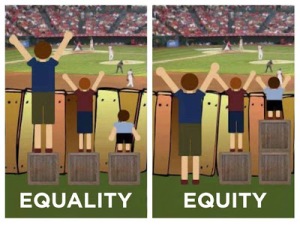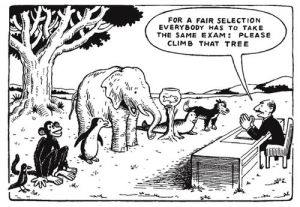Why Equality Isn’t Fair: A Lesson from Fourth Grade
With much discussion in Women’s Center staff meetings about actively applying our work in the Center as student staff members to other areas of our lives, I have recently been thinking a lot about how my experiences and education in social justice and activism coincide with the various roles and responsibilities I hold outside of the Center. Currently in the process of working towards receiving teacher certification in elementary education, one of my most valued roles this academic year is my internship as a student teacher in a fourth grade classroom. Watching my students embrace new concepts and grow as individuals each week has not only brought an immense amount of pleasure and fulfillment into my life, but it has also caused me to think rather critically about how learning in the classroom translates outside to the “real world”. I’m not talking about how that math equation we learned last week can help us to calculate a tip on a restaurant bill, or how that new vocabulary word can be used to impress our relatives, but instead about how simple classroom dynamics can set a pretty important example for those of us who are long removed from our own elementary school classrooms.
Although we live in a society that preaches equality and fairness, perhaps one of the most important concepts I have learned in the classroom thus far is that equality and fairness are far from interchangeable terms. Imagine a classroom where students are instructed to independently read a chapter out of a textbook and take notes on what they are reading. Several students are reading quietly to themselves and taking notes on a sheet of paper, while another student is listening to an audiobook through headphones, and yet another student is talking to a classroom volunteer who is writing notes down for the student. If this were an equal environment, all students would be required to complete the assignment in the exact same way. But is equality in this situation really fair? Without certain accommodations, students with learning disabilities or special needs may be unable to complete the assignment on their own. The truth is, equality is only fair when everyone is the exact same to begin with. This is an extremely unlikely situation not only in the classroom, but in life in general. Instead of promoting fairness amongst individuals within a community, in actuality equality erases differences that exist within a group of individuals and only supports those with the most privilege. Equality is a “colorblind” approach to fairness and it can be especially harmful when it prevents students from lower income families and those who struggle with disabilities from obtaining the resources they need to succeed.
 Because not all students (or people, for that matter) are born with the same abilities and some experience challenges that inhibit that their success, some individuals need more resources in order to just catch up to their peers. Therefore instead of talking about equality, we need to focus on another approach: equity. While equality simply seeks to level the playing field for everyone, equity seeks to provide more resources to those who need them. Take for example the large population of English Language Learners (ELLs) attending schools today. These students are often significantly behind their native-English speaking peers- not because they are unintelligent, but because they lack an upbringing that enables them to understand the language in which they are being taught. Therefore, these ELL students need more resources (perhaps in the form of ESOL classes or classroom accommodations) simply just to survive in the school system. Equity forces us to examine various privileges that exist within a community or a society and prompts us to make certain accommodations that will assist those with a lack of privilege. Instead of seeing just one route to success, equity forces us to pave multiple roads for multiple people. It isn’t an easy process by any means, but the extra work we put into through society through creating equitable situations brings us closer to fairness than equality ever will.
Because not all students (or people, for that matter) are born with the same abilities and some experience challenges that inhibit that their success, some individuals need more resources in order to just catch up to their peers. Therefore instead of talking about equality, we need to focus on another approach: equity. While equality simply seeks to level the playing field for everyone, equity seeks to provide more resources to those who need them. Take for example the large population of English Language Learners (ELLs) attending schools today. These students are often significantly behind their native-English speaking peers- not because they are unintelligent, but because they lack an upbringing that enables them to understand the language in which they are being taught. Therefore, these ELL students need more resources (perhaps in the form of ESOL classes or classroom accommodations) simply just to survive in the school system. Equity forces us to examine various privileges that exist within a community or a society and prompts us to make certain accommodations that will assist those with a lack of privilege. Instead of seeing just one route to success, equity forces us to pave multiple roads for multiple people. It isn’t an easy process by any means, but the extra work we put into through society through creating equitable situations brings us closer to fairness than equality ever will.
Posted: October 20, 2014, 10:47 PM
